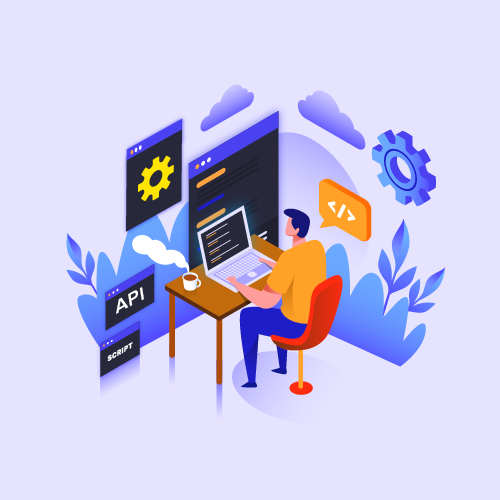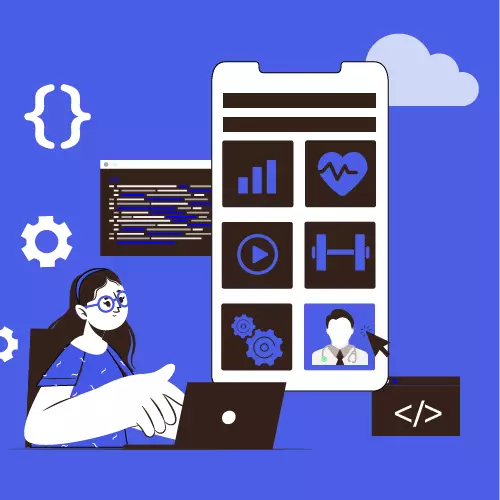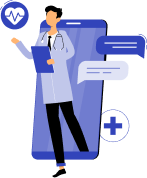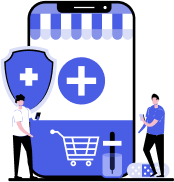- Benefits of Healthcare Mobile Apps for Patients and Providers
- Benefits for Medical Professionals
- Benefits for General Users
- Types of Healthcare Mobile App Development
- Healthcare Apps for Hospitals and Medical Professionals
- Healthcare Apps for Patients and General Users
- Mitigating Risks While Reaping the Rewards of Healthcare Apps
- Lack of Detailed Focus in One Domain
- Non-Compliance with the Law
- Lack of Security
- Presence of Multiple Channels and Devices
- How to Develop a Healthcare App? A Step-By-Step Process
- Define Your App’s Idea and Goal
- Conduct Market and Regulatory Research
- Hire Healthcare App Developers
- Choose the Right Platform
- Decide on the Location for the App Launch
- Select a Monetization Strategy
- Pay Attention to UI/UX Design
- Develop an MVP
- Test Your App
- Launch and Update
- Healthcare App Development Best Practices
- Following all the Compliance Rules
- Defining a Single-Focused Purpose
- Ensuring Seamless Interoperability
- Selecting the Right Feature Set
- Implementing Hack-Proof Cybersecurity Measures
- Choosing the Most Effective APIs and Integrations
- Healthcare App Development Features
- Next-Gen Advanced Features Every Healthcare App Must Have
- Key Trends and Emerging Technologies Used for Healthcare Application Development
- Artificial Intelligence
- Cloud Computing
- AR and VR
- Blockchain
- IoT and Wearable Technology
- 5G Connectivity
- Custom Healthcare App Development Cost and Time
- How to Generate Revenue from Your Healthcare App
- Pay-Per-Consultation
- Subscription Plans for Premium Features
- Licensing and B2B Partnerships
- In-App Advertising
- Commission from Marketplace Transactions
- How Appinventiv Helped a Healthcare Provider Boost Operational Efficiency by 30% with an AI-Driven App
- How Can Appinventiv Help You with Healthcare App Development?
- FAQs
Key Takeaways:
What You’ll Learn:
- How healthcare apps are revolutionizing patient care through real-time monitoring and personalized health solutions.
- The role of telemedicine and wearables in delivering accessible, on-demand healthcare experiences.
- Why data security and regulatory compliance (e.g., HIPAA) are non-negotiable in healthcare app development.
Stats That Matter:
- 75% of healthcare executives see digital transformation as vital for streamlining clinical processes.
- The global digital health market is expected to exceed $800 billion by 2030, driven by rising adoption of telemedicine and AI-driven solutions.
- 53% of healthcare apps fail due to poor user experience and security vulnerabilities.
Real Client Outcome:
- Health-e-People streamlined medical record access, reducing operational costs and improving patient care for healthcare providers.
- Soniphi enhanced real-time health monitoring through vocal frequency analysis, boosting user engagement and wellness tracking.
- DiabeticU improved diabetes management, leading to better health outcomes and increased treatment adherence among users.
Digital health is no longer a choice, but a necessity for healthcare organizations striving for resilience, efficiency, and improved outcomes. Take, for instance, Amazon’s rebranding of Amazon Clinic to Amazon One Medical Pay‑per‑visit in June 2024. This integration allows users a $29 messaging visit or a $49 video consultation for over 30 common conditions. Additionally, it offers seamless prescription delivery via Amazon Pharmacy, reducing friction and enhancing care access.
An example like Amazon’s rebranding, signals where the industry is heading. As healthcare organizations adapt to changing expectations, digital solutions like AI diagnostics, smart wearables, and remote monitoring are enabling more precise, proactive, and personalized care.
According to a report by McKinsey, 75% of healthcare executives view digital transformation as a crucial factor for streamlining clinical processes, yet many remain concerned that the required investments may fall short.
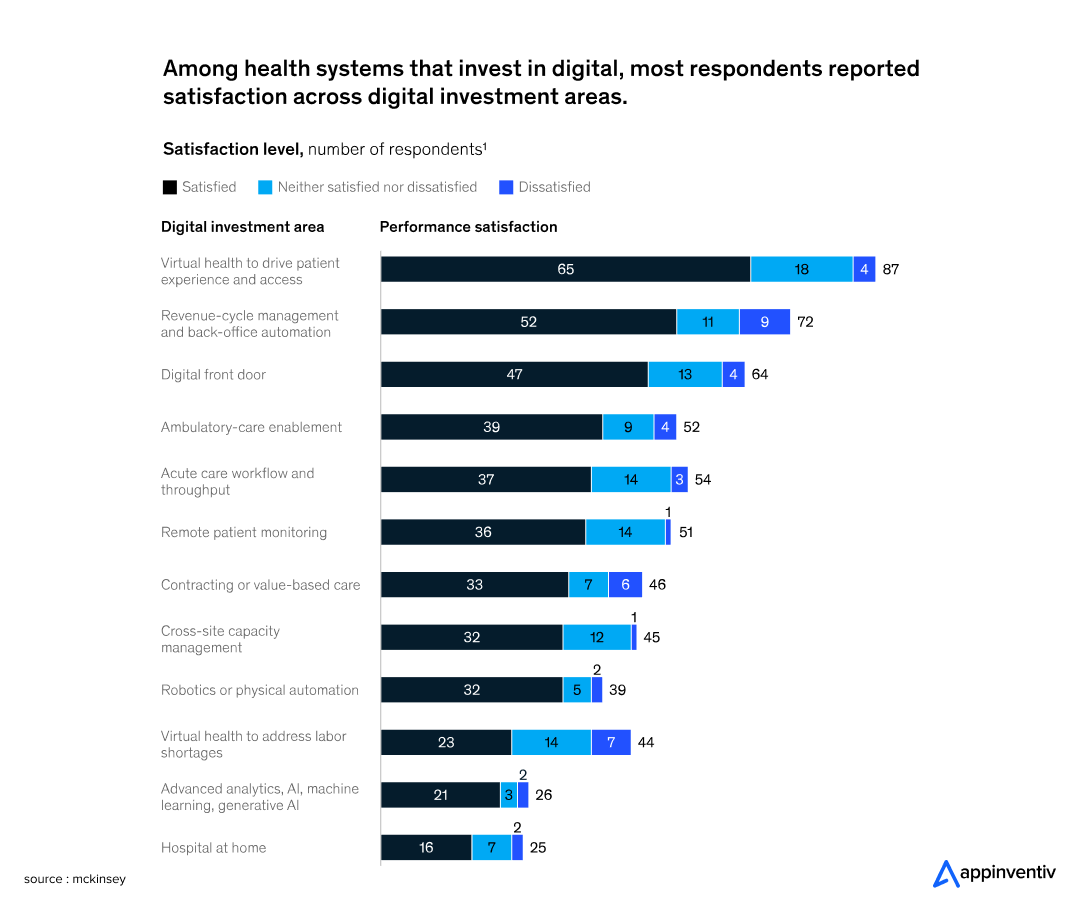
Also, the global digital health market is projected to exceed $800 billion by 2030, driven by the rising adoption of telemedicine, wearable technology, and AI-driven healthcare solutions (Source: Grand View Research). Hospitals, startups, and medical institutions are racing to develop apps that enhance patient care, streamline operations, and improve health outcomes.
However, while the opportunities are vast, 53% of healthcare apps fail due to poor user experience, security vulnerabilities, and lack of a clear value proposition. (Source: NLM database). So, what does it take to build a healthcare app that truly makes an impact?
To support you in your healthcare application development journey, we have compiled a comprehensive guide that provides valuable insights into mobile health app development best practices, processes, types, benefits, costs, and more.
So, without further ado, let’s jump right into this healthcare mobile app development guide and uncover the essential details revolving around medical application development.
Ready to make a difference in healthcare?
Benefits of Healthcare Mobile Apps for Patients and Providers
One of the primary reasons iOS and Android healthcare app development have become so popular for businesses is that they offer countless benefits to general users and medical professionals while facilitating the healthcare industry’s progress. If you create a healthcare app, you will gain limitless benefits that will help automate operational processes and improve the financial performance of medical institutions. Let’s learn how.
Beyond traditional medical applications, businesses are also investing in Fitness App Development to promote preventive healthcare and encourage users to maintain healthy lifestyles through activity tracking and personalized workout plans.
Benefits for Medical Professionals
Digital health app development is often a time-consuming and expensive process. However, it provides its investors and stakeholders with extensive value in:
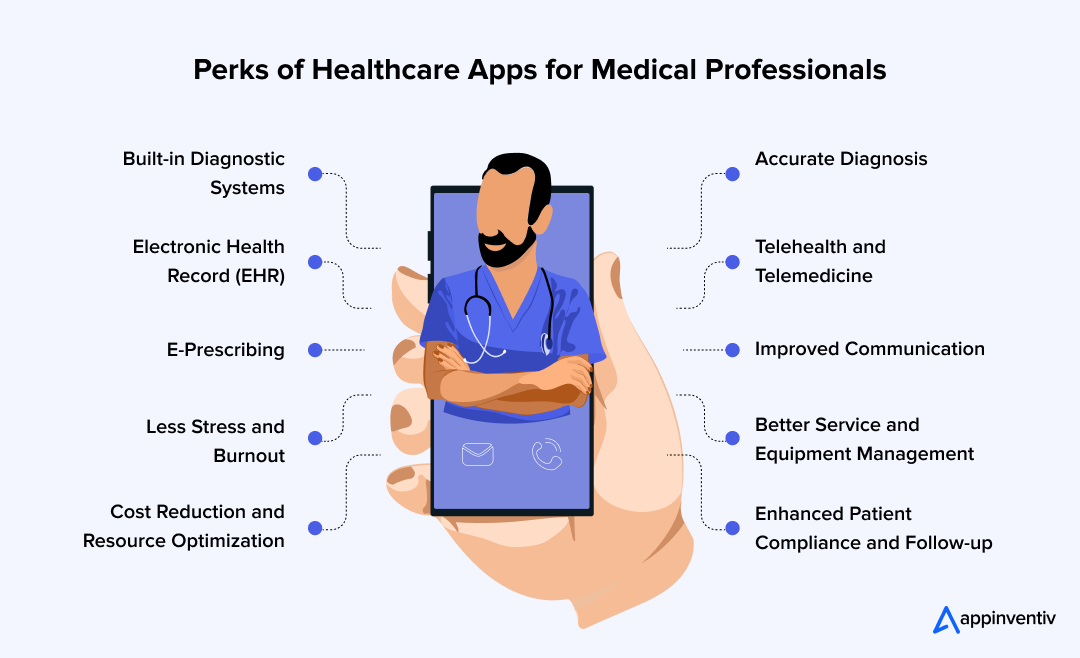
Built-in Diagnostic Systems
These systems enable the collection and processing of data from embedded IoT devices integrated with EHR platforms. The doctors can easily analyze and diagnose the condition of remote patients, track progress, and determine treatment.
This seamless integration enhances real-time decision-making, allowing for proactive interventions. Additionally, it improves patient engagement by providing continuous monitoring and personalized care plans.
Accurate Diagnosis
Medical apps facilitate healthcare professionals with early and accurate diagnosis of diseases. With precise and built-in diagnostic systems come better treatment plans, timely healthcare delivery, and effective outcomes.
These apps also help reduce diagnostic errors and improve clinical decision-making. Moreover, AI-powered diagnostic tools enhance efficiency by analyzing vast datasets and identifying patterns that human practitioners might overlook.
Electronic Health Record (EHR)
With the optimization of EHR solutions, healthcare apps can easily track, store, and collect all patient-related information on a single platform. This saves time, eliminates errors, and allows the exchange of patient data between different healthcare institutions.
Similar EHR-driven workflows are central to chiropractor app development, where scheduling, care plans, and visit history must stay tightly connected.
For instance, in early 2025, Tempus AI introduced “Olivia,” an AI-powered personal health app that aggregates patient data from over 1,000 healthcare systems through seamless EHR integration.
Telehealth and Telemedicine
Telehealth has emerged as one of the fastest-growing sectors in the healthcare industry, with the global market expected to grow substantially. This surge is largely driven by the increasing demand for telemedicine and telehealth software solutions, including Software as a Medical Device (SaMD). These technologies empower healthcare professionals to deliver remote services, facilitate online communication, and provide high-quality medical care more efficiently.
As a result, telehealth has become an integral component of modern healthcare delivery, offering patients greater access to care and enabling providers to reach a broader patient base.
For instance, investing in doctor-on-demand app development allows healthcare professionals to offer consultations via video or audio calls. It also helps patients to book appointments at their convenience.
E-Prescribing
E-prescribing apps enable doctors to prescribe medications for patients accurately, adjust dosages to minimize potential side effects, and revoke prescriptions as needed. These platforms play a crucial role in reducing pharmacy errors and optimizing the time of both doctors and patients.
An e-prescribing app enables doctors to upload prescriptions directly within the app, tailored to the patient’s specific requirements.
Also Read: The GoodRx App Development Cost: Insights and Analysis
Improved Communication
Various telehealth applications help doctors connect with patients remotely for significant consultations and discussions. With automated features and streamlined workflows, healthcare providers can focus more on patient care and less on administrative tasks.
This reduction in manual work and improvement in operational efficiency directly contribute to lower stress levels and minimize burnout among healthcare workers, fostering a more sustainable working environment.
Less Stress and Burnout
Doctor consultation app development liberates professionals from repetitive tasks by increasing the reliability of medical systems and processes. For instance, a custom healthcare app tracks all active on-premise ventilators. Healthcare facilities can better allocate resources and ensure timely maintenance by offering real-time alerts and performance metrics.
This proactive approach to equipment management improves uptime, reduces the risk of malfunction, and enhances the overall quality of patient care.
Better Service and Equipment Management
Mobile health application development allows users to monitor medical equipment in real-time and optimize its use accordingly. This real-time tracking ensures that medical devices are always in optimal working condition, reducing downtime and improving overall patient care.
For instance, a custom healthcare app tracks all active on-premise ventilators, enabling healthcare providers to quickly assess equipment status, schedule maintenance, and prevent unnecessary delays in treatment.
Cost Reduction and Resource Optimization
Healthcare apps help medical practices save finances by cutting down on paper costs, reducing staff overtime, and preventing expensive medical errors that lead to lawsuits.
When everything runs smoother digitally, you need fewer people doing administrative work, and doctors can see more patients in the same amount of time. Many practices report saving thousands of dollars monthly just from going paperless and automating their appointment reminders.
Enhanced Patient Compliance and Follow-up
One of the biggest headaches for doctors is getting patients actually to follow treatment plans and show up for follow-up appointments. Healthcare apps address this by sending medication reminders, tracking whether patients are taking their medication, and reminding them about upcoming appointments.
When patients stick to their treatment plans better, doctors see improved outcomes and fewer emergency situations that could have been prevented.
Benefits for General Users
Healthcare apps have a wide range of use cases that benefit patients and general users. These apps utilize the convenience and accessibility of mobile phones to enhance the delivery of medical services and improve the overall healthcare experience for patients. Here are some remarkable benefits of hospital mobile apps for patients:
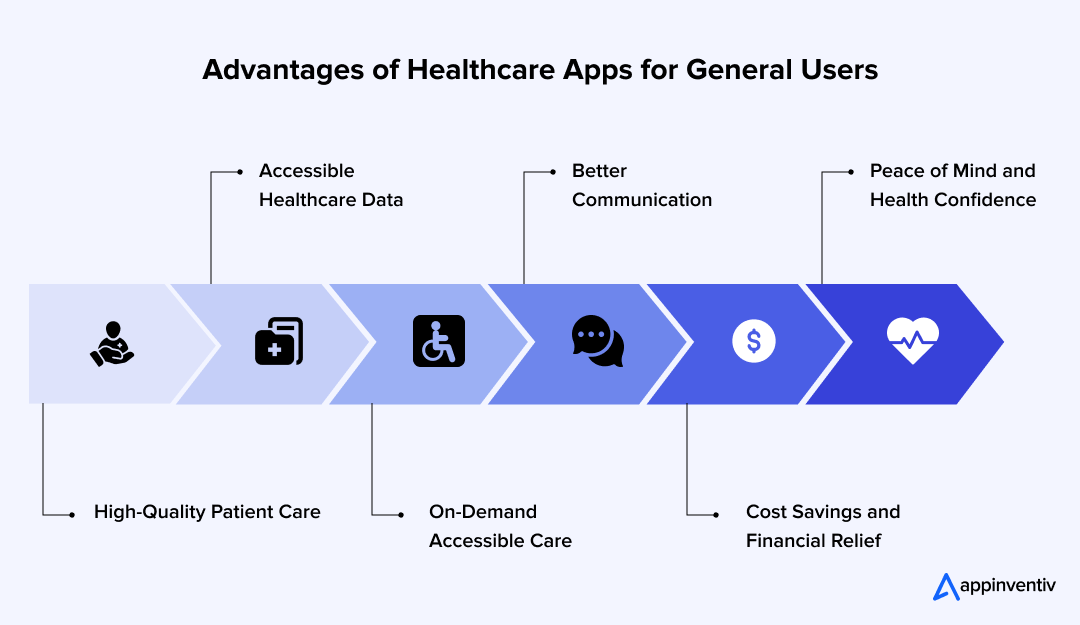
High-Quality Patient Care
With advanced healthcare apps for fitness, nutrition, etc., patients can track their disease symptoms, chronic conditions, sleep patterns, heart rate, and overall health using IoT-connected wearable devices or smartphone sensors. Continuous monitoring enables the early detection of health issues and facilitates timely intervention, thereby improving overall patient care.
Accessible Healthcare Data
A mobile app platform makes healthcare information and medical data easily accessible for better patient monitoring. Now, patients can access healthcare information and news at home or even on the go and share their health data and symptom reports with their healthcare providers.
At Appinventiv, we developed Health-e-People, a dynamic healthcare platform designed to improve patient care and streamline medical record management. Utilizing advanced, user-centric technologies, it overcomes the limitations of traditional systems, ensuring seamless access to critical health information.
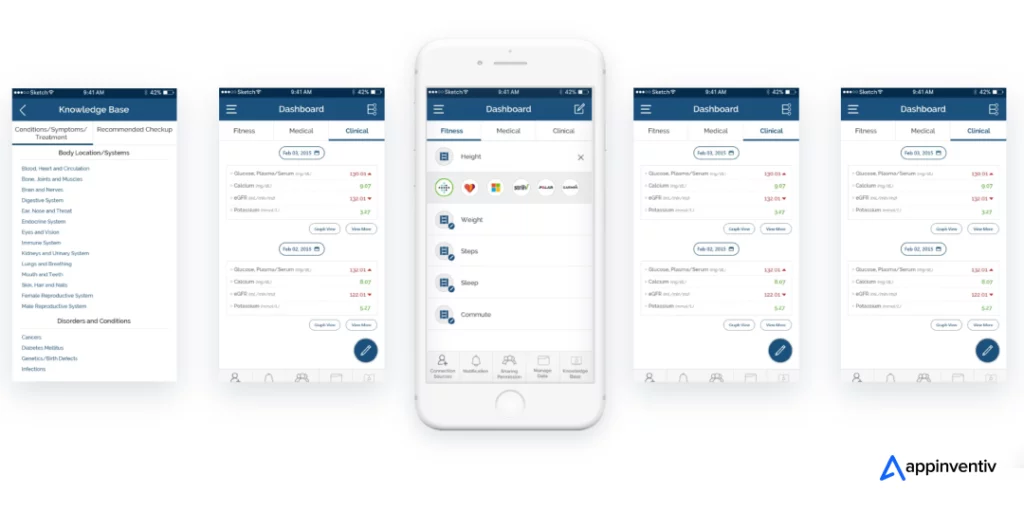
As a leading patient-focused solution, Health-e-People empowers both patients and caregivers with intuitive tools that enhance engagement, streamline care coordination, and inform decision-making.
On-Demand Accessible Care
Mobile app development for healthcare makes on-demand medical services accessible to every common user. Medicine delivery app development ensure the quick delivery of medical care services directly to patients’ doorsteps, including drug delivery, medicine delivery, sample collection, and prescription fulfillment.
These apps also provide real-time order tracking, automated prescription refills, and integration with telemedicine platforms for seamless consultations. Additionally, AI-powered recommendations help users manage their medications effectively, reducing the risk of missed doses and improving adherence to treatment plans.
Better Communication
Medical apps empower patients with real-time connectivity to caregivers, enabling timely consultations and support. Features like instant messaging, video calls, and secure data sharing enhance accessibility and responsiveness. Patients can easily discuss symptoms, receive guidance, and track their health progress without delays.
This continuous interaction drives better engagement, improves care coordination, and ensures more personalized treatment. By bridging communication gaps, medical apps contribute to more efficient and effective healthcare delivery.
Cost Savings and Financial Relief
Healthcare costs keep going up, but apps help users save expenses in ways they might not expect. Instead of rushing to urgent care for minor issues, users can get advice through telemedicine consultations that cost a fraction of an office visit.
Many pharmacy apps now assist users in identifying generic medications and locating nearby pharmacies offering the best prices. Additionally, with the rise of medicine delivery apps, users can conveniently order prescriptions online, reducing unnecessary emergency room visits for conditions that can be effectively managed at home with over-the-counter or prescribed medications.
Peace of Mind and Health Confidence
One of the biggest benefits people don’t talk about enough is how these apps reduce health anxiety. When users can track their symptoms, monitor vital signs, and access medical guidance easily, it provides peace of mind and empowers them to take the most appropriate course of action.
Many users say they feel more confident managing their health because they have reliable information at their fingertips instead of googling symptoms and scaring themselves with worst-case scenarios. Having health data organized and accessible also means users are better prepared for doctor visits and can have more meaningful conversations about their care.
Considering the above benefits, if you have decided to build a healthcare app, you should explore the various types of healthcare app solutions available in the industry.
Types of Healthcare Mobile App Development
mHealth app development encompasses a range of applications that contribute to improved healthcare management and enhanced overall well-being. Depending on their purpose of use, healthcare apps can be categorized into two main groups: apps for medical professionals and apps for general users. Let’s check out the key types of healthcare apps based on each category.
Healthcare Apps for Hospitals and Medical Professionals
These healthcare apps are supposed to bring value to medical staff, facilities, doctors and physicians, which is why they are developed in a more complex way with advanced and reliable features. Some common healthcare mobile apps for professionals are:
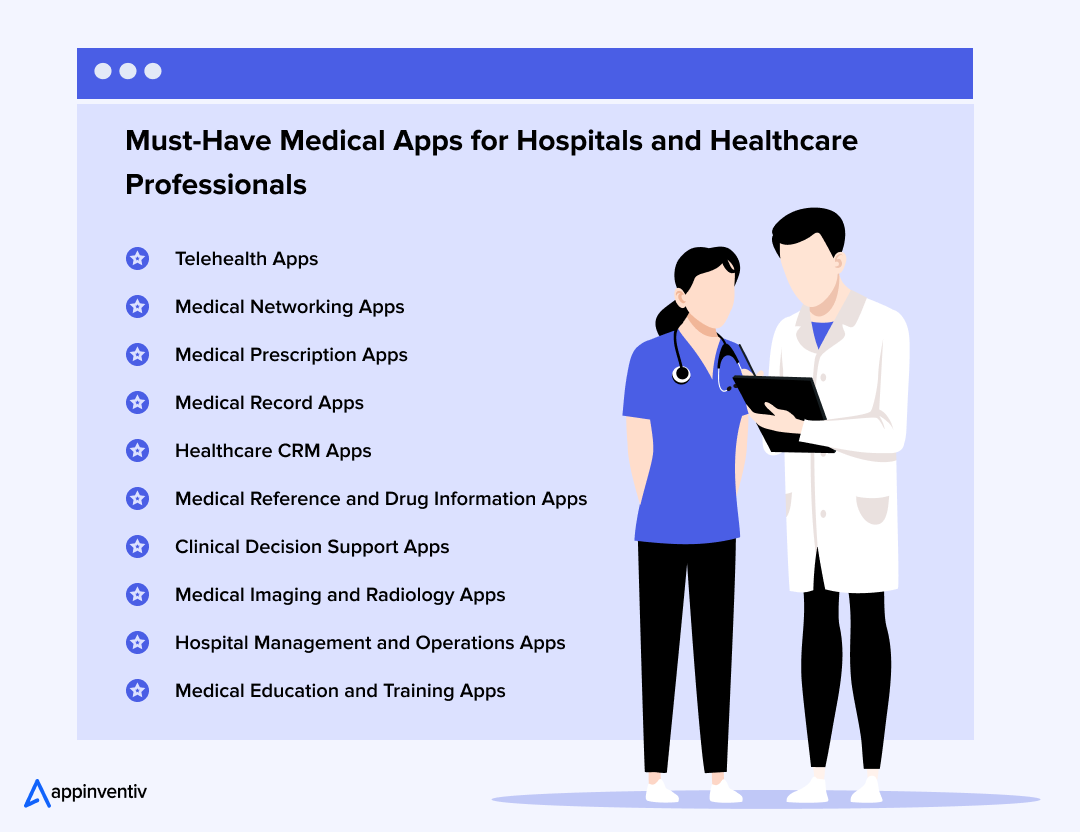
Telehealth Apps
Mobile app development for healthcare allows doctors to schedule appointments and provide medical consultations using in-app messaging and video calls. Telehealth applications are convenient for both doctors and patients, as they help avoid physical contact and provide care in the comfort of their own homes. Some popular examples include telehealth apps like TelaDoc and GoodRx Care.
Also Read: How much telemedicine app development costs
Medical Networking Apps
Although medical professionals are quite busy with hospital management and patient services, they must communicate with other medical experts and share expertise to improve communication. This communication is done through medical networking apps. Some popular examples of medical apps for networking are Doximity, Sermo, and WeMedUp.
Medical Prescription Apps
Prescription healthcare apps help professionals select the right medication for their patients, compile a list, and track usage and administration times. Some medical apps even allow patients to print prescriptions to show at the nearby pharmacy.
Medical Record Apps
Medical record health applications help simplify collecting and updating patients’ medical data. The data records consist of blood pressure, body temperature, medical examinations and diagnoses, prescriptions, appointments, and various criteria to track medical health.
Healthcare CRM Apps
Healthcare CRM apps streamline patient management by organizing appointments, medical history, and communication between patients and providers. They improve hospital workflows, enhance patient engagement, and ensure seamless care coordination. These apps also facilitate billing, insurance claims processing, and automated follow-ups to improve patient retention.
Medical Reference and Drug Information Apps
These apps provide healthcare professionals with instant access to drug databases, medical references, and clinical guidelines. They include drug interaction checkers, dosage calculators, and comprehensive medical literature. Popular examples include Epocrates, Medscape, and UpToDate.
Clinical Decision Support Apps
Clinical decision support applications assist healthcare providers in making evidence-based treatment decisions by providing diagnostic tools, treatment protocols, and risk assessment calculators. These apps help reduce medical errors and improve patient outcomes through data-driven insights.
Medical Imaging and Radiology Apps
These specialized apps allow radiologists and other medical professionals to view, analyze, and share medical images such as X-rays, MRIs, and CT scans on mobile devices. They enable remote consultations and faster diagnosis turnaround times.
Also Read: Radiology Redefined: How Apps are Revamping Medical Imaging
Hospital Management and Operations Apps
Comprehensive hospital management applications help streamline administrative tasks, staff scheduling, inventory management, and resource allocation. These apps improve operational efficiency and reduce administrative burden on healthcare staff.
Medical Education and Training Apps
Educational apps designed for medical professionals provide continuing education, certification courses, medical simulations, and skill assessment tools. They help healthcare workers stay updated with the latest medical practices and maintain their professional certifications.
Healthcare Apps for Patients and General Users
Healthcare applications for patients are designed to assist general users in making their lives easier. With basic medical assistance, these healthcare apps are simple yet valuable in a wide range of wellness aspects. Different types of mobile healthcare application development for patients are:
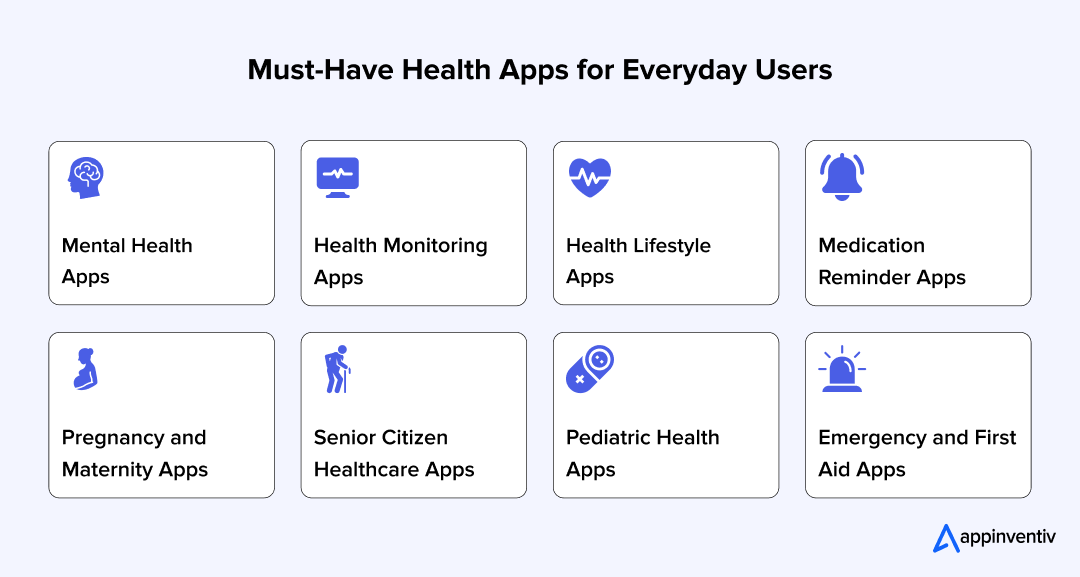
Mental Health Apps
Mental health apps target making therapy more accessible, flexible, and efficient for general users. These apps usually assist in fighting anxiety, depression, and insomnia with the help of various pre-recorded sessions, gaming elements, breathing exercises, etc.
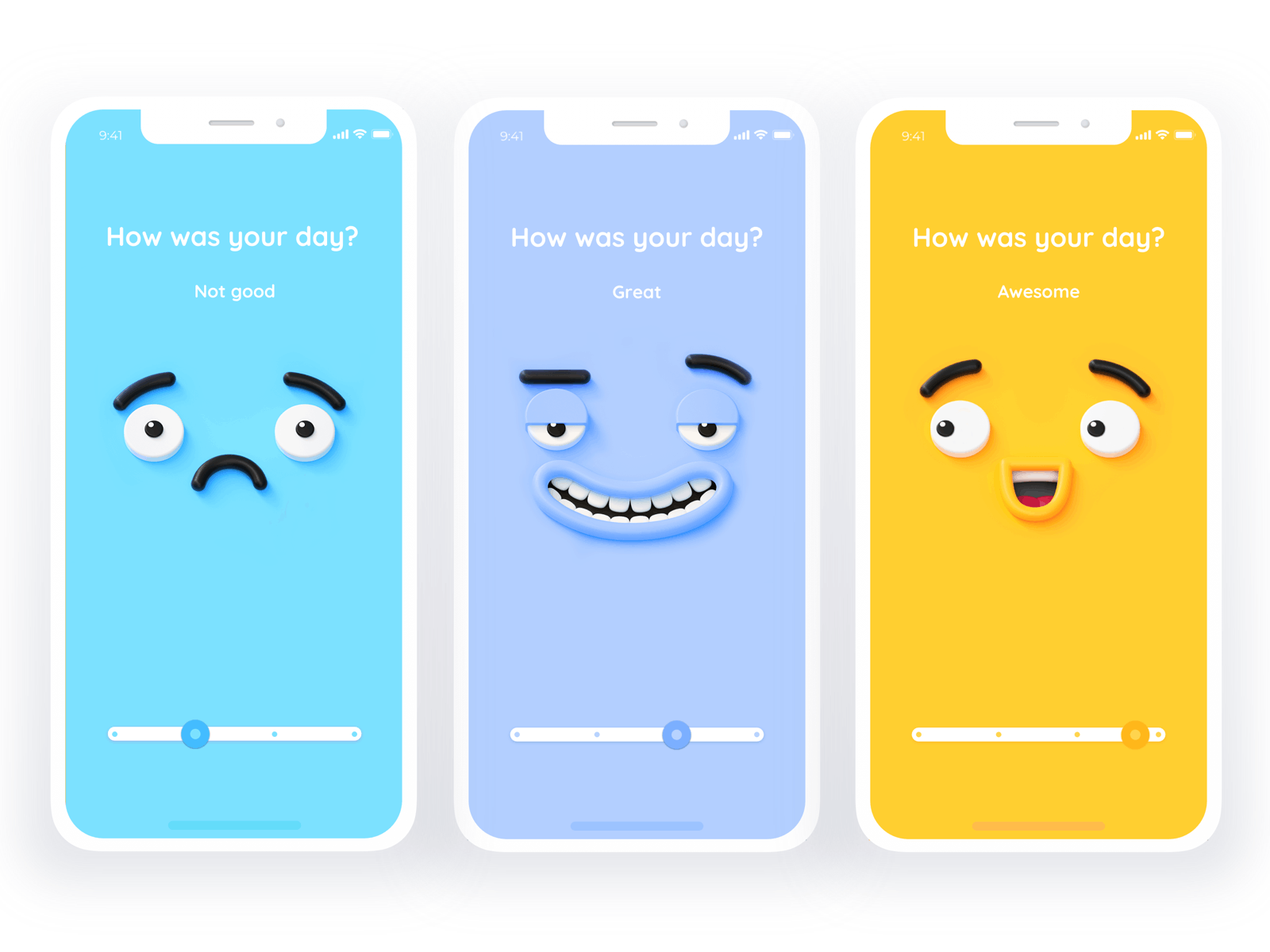
Some popular mental health app examples are MoodKit, Headspace, and Mindshift.
Health Monitoring Apps
Health monitoring apps help track and manage chronic conditions such as diabetes, blood pressure, and so on. A few well-known health monitoring apps are WebMD, Ada, and The Diary. Soniphi, the first resonant frequency-based personal wellness healthcare app developed by Appinventiv, is another considerable example of a health monitoring app.
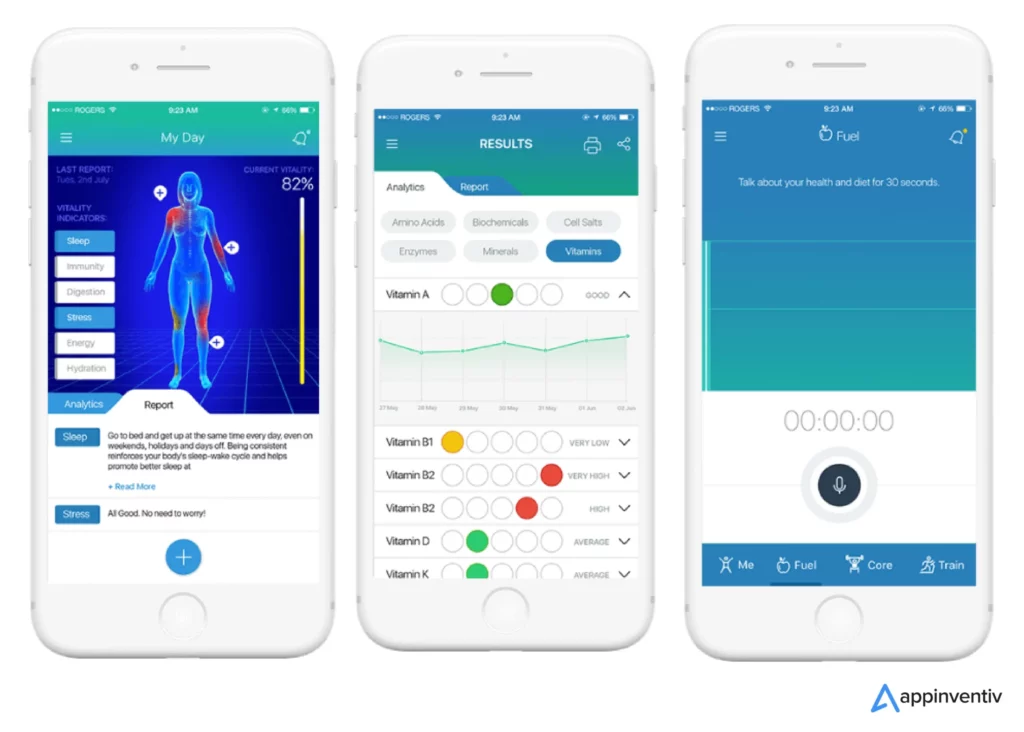
This wellness system utilizes vocal information to generate a comprehensive well-being analysis report.
Health Lifestyle Apps
This healthcare mobile app development category for patients brings together different applications such as fitness and nutrition apps, self-improvement apps, weight loss apps, mind training apps, and many others that help achieve a healthy lifestyle. Some popular health lifestyle apps are HealthPal, MyFitnessPal, Remente, and MoodPath.
Appinventiv created DiabeticU, an innovative AI-driven diabetes management app that enhances patient support. It provides real-time responses to user queries, connects individuals with diabetes experts, and builds a strong, supportive community.
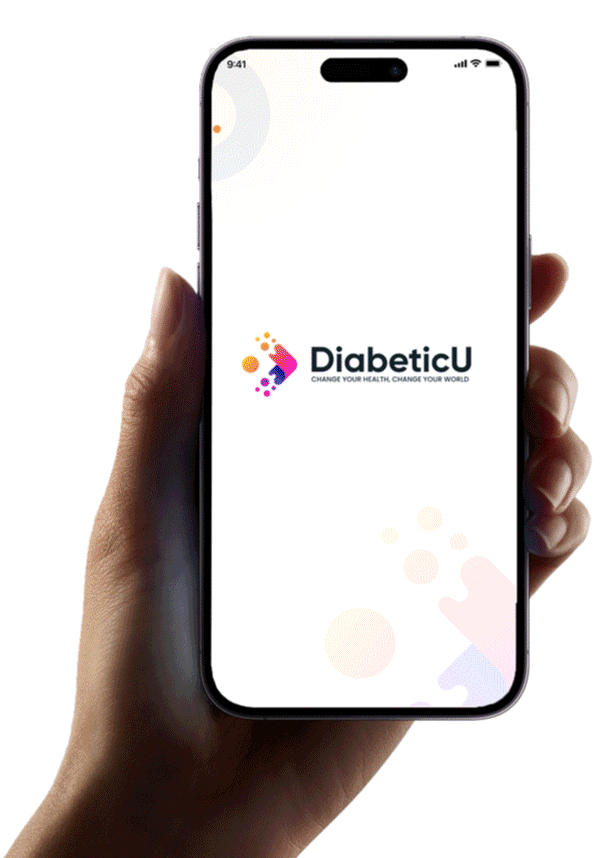
By empowering users to take charge of their health, DiabeticU promotes a healthier lifestyle and highlights the transformative role of AI in modern healthcare.
Medication Reminder Apps
These apps send automated reminders to help patients take medications on time, reducing missed doses. They offer dosage tracking, refill alerts, and medication interaction warnings to enhance treatment adherence. Some apps include smart pill dispensers and caregiver notifications to ensure better patient compliance.
Pregnancy and Maternity Apps
Pregnancy tracking apps guide expectant mothers from conception through childbirth and beyond. These apps track weekly pregnancy progress, show baby development stages, remind users about appointments, and provide preparation guides for labor and delivery. What to Expect, BabyCenter, Ovia Pregnancy, and Glow Baby are trusted options that also offer postpartum support, breastfeeding help, and newborn care advice.
Senior Citizen Healthcare Apps
Senior citizen-focused health apps cater to older adults by addressing age-related health concerns with user-friendly designs. These apps typically feature larger text, simple navigation, medication management, fall detection, emergency contacts, and tools for managing chronic conditions. Apps like GrandPad Health, Medisafe, and CareZone help seniors maintain their independence while keeping caregivers and healthcare providers informed.
Pediatric Health Apps
These apps help parents and caregivers monitor children’s health and development effectively. They track growth patterns, manage vaccination schedules, provide symptom checkers for common childhood illnesses, and monitor developmental milestones. Baby Tracker, KidsDoc, and Shot@Life are reliable options that offer age-appropriate health information and connect parents with pediatric resources.
Emergency and First Aid Apps
Emergency healthcare apps provide crucial information and guidance during medical crises. These apps include first aid instructions, CPR guidance, emergency contact management, and location-based emergency services.
Turn critical care into a seamless digital experience by building a app that truly makes a difference.
Mitigating Risks While Reaping the Rewards of Healthcare Apps
Before diving into healthcare app development, it’s important to recognize these ventures’ high-risk, high-reward nature. According to a report by The HIPAA Journal, a 17.9% month-over-month increase in healthcare data breaches was observed in April 2025, with 66 incidents involving 500 or more records reported to the HHS Office for Civil Rights (OCR).
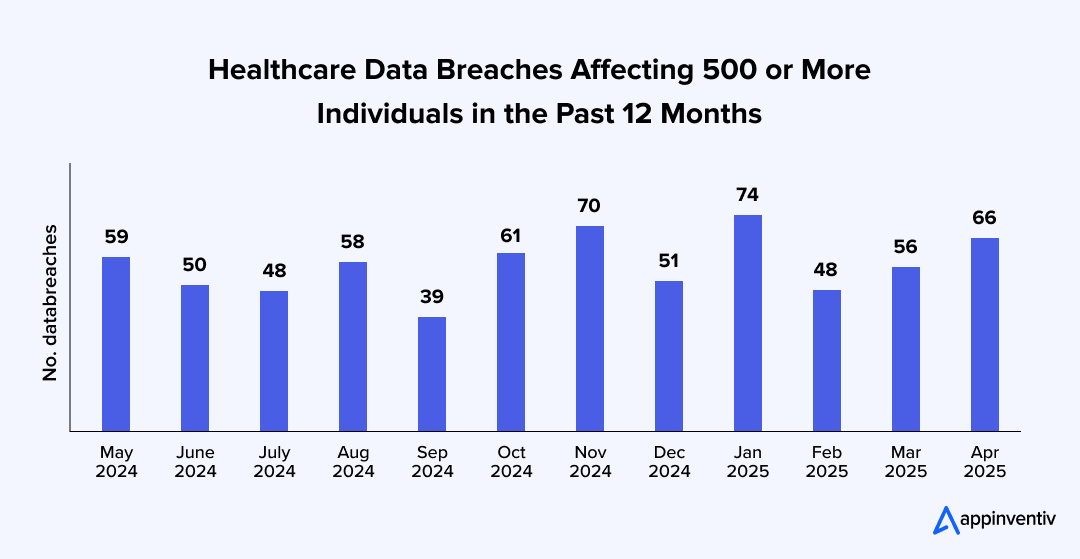
While healthcare apps offer massive potential in improving patient care, streamlining operations, and driving innovation, they also expose development companies to legal, ethical, and financial challenges. Navigating this landscape requires a balance between creating cutting-edge solutions and ensuring robust security and compliance to protect both users and developers from potential pitfalls.
Let us discover the reasons why many healthcare apps fall short of delivering lasting value to doctors and patients, and how the right strategy, technology, and user focus can turn those challenges into meaningful outcomes.
Lack of Detailed Focus in One Domain
When a doctor or patient installs a health app, they often look for the redressal of one issue, not multiple. So, instead of having an application that solves numerous problems on the surface level, a healthcare app that addresses one point in its utmost depth has a higher success rate.
Solution:
A successful healthcare app should focus on precisely solving a single, well-defined problem. Conduct thorough market research to identify critical pain points and develop specialized solutions, such as chronic disease management, telemedicine, or medication adherence tracking.
Non-Compliance with the Law
Multiple compliance bodies are responsible for handling how the mobile health domain behaves. While being compliant with industry-specific regulations is intimidating, its absence can be one of the biggest reasons why healthcare stakeholders don’t believe in the application.
The lack of approval by the FDA or a HIPAA-compliant badge in the application’s home screen or the screenshots used in the App Store and Play Store keeps the stakeholders at bay.
Solution:
Ensure compliance with industry-specific regulations by integrating secure data storage, encryption, and access control measures. Highlight certifications like HIPAA or GDPR compliance within your app and marketing materials to build trust.
Lack of Security
Although security is one of the first things every healthcare organization should consider, only a few apps take the task seriously. Millions of stories about patients’ data getting hacked or misplaced because of insecure storage infrastructure. The compliance mentioned above solves the issue somewhat, but mobilebut a mobile app development experts should implement all the security measures while developing an application.
Solution:
Prioritize security by implementing end-to-end encryption, multi-factor authentication, and secure cloud storage. Regular security audits, penetration testing, and compliance with cybersecurity standards like NIST and HITRUST help reinforce app security and prevent vulnerabilities.
Presence of Multiple Channels and Devices
With several devices entering the market – smartphones, personal assistants, smart TVs, wearables, etc., interoperability has become a key challenge for healthcare application development. It makes it intimidating to ensure that the private medical data flowing in the cloud cannot be hacked.
Solution:
Leverage healthcare interoperability standards like FHIR (Fast Healthcare Interoperability Resources) and HL7 to facilitate secure data exchange between devices. Conduct cross-platform testing to ensure compatibility across different operating systems and devices while maintaining security and performance.
To overcome these challenges, businesses should partner with experienced development service providers.
How to Develop a Healthcare App? A Step-By-Step Process
The healthcare mobile app development process involves several steps, best practices, and a definite plan to ensure a successful and user-friendly application that can drive the right results for patients and healthcare providers. Therefore, before you initiate your healthcare app development journey, you must clearly understand your app’s goal, what kind of app you want, what features it will have, who your target audience will be, what purposes it will target, and how.
We will discover each step of the healthcare mobile app development process by evaluating these vital considerations.
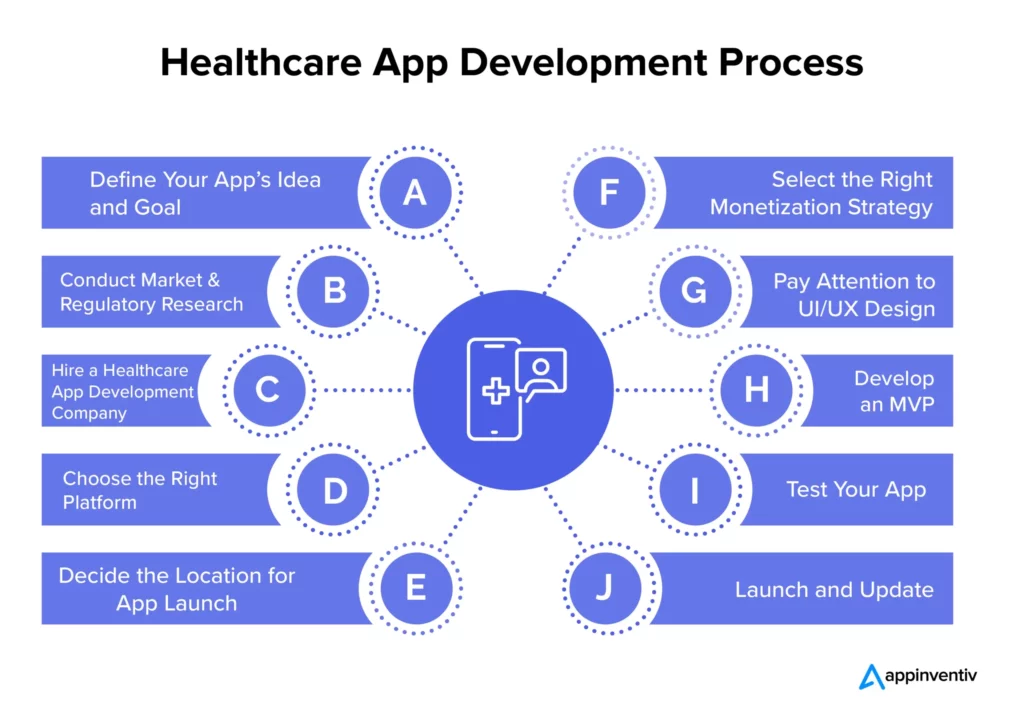
Define Your App’s Idea and Goal
Understanding your end-users’ needs is the first and most crucial step in the process to develop a healthcare app. Evaluate the problems they are facing and how your application can solve them. At this stage, you should also consider the app type.
For example, you may want to develop a niche-based application focused on diabetes or anxiety tracking. Therefore, you need to have a clear idea of your target audience, their needs, and keep it aligned with your app’s goal.
Conduct Market and Regulatory Research
After understanding your target audience’s needs and pain points, you need to conduct market research to analyze your competitors and identify gaps in the market that your app can fill. It will help you define your app’s features and functionalities, further aiding you in meeting your end goal.
When conducting market research, it is essential to understand the regulatory compliance requirements applicable to the healthcare industry. The healthcare industry deals with a vast volume of protected health information (PHI), making it essential for you to comply with HIPAA regulations (more details later).
Hire Healthcare App Developers
Hiring a reliable tech agency with a team of experienced healthcare app developers ensures that your app is developed using all the essential technologies and trending features required to make your app successful in the healthcare market. A reputed healthcare tech agency has a skilled team of UI/UX designers, developers, testers, project managers, and market specialists who work relentlessly to bring your healthcare app idea to life.
Choose the Right Platform
After defining your app’s goal, it is time to choose the platforms your application will be deployed on – Android, iOS, or the web. You can also think of adding a home assistant device integration to ensure that your application is only a voice command away. A key thing to note here is that elderly patients generally tend to prefer visiting a website, while their young counterparts are more likely to use apps and voice devices.
Decide on the Location for the App Launch
Entrepreneurs, business leaders, and tech heads most commonly launch a new app by building it for their nationals. If you or your board members wish to take an alternate route and launch your application internationally, consider the nation-specific guidelines and user personas, highlighting medical app creation and deployment.
Select a Monetization Strategy
The primary objective behind all types of mobile app development across various domains is to generate revenue. When discussing how to earn money from an app, the healthcare domain operates under two primary models: a subscription-based model and a freemium model with paid access to premium services.
Furthermore, healthcare providers can also opt for in-app advertisements, third-party partnerships, and other monetization models to earn revenue through the medical apps.
Pay Attention to UI/UX Design
UI/UX design plays a crucial role in healthcare mobile application development, determining the success of your medical apps. Generally, older people like simple navigation and bigger fonts, while a younger audience prefers a colorful UI with better functionalities.
The design will also depend on whether your audience is healthcare professionals or the general public. In addition to the visual component, it’s essential to consider how the app will appear on various-sized screens. So, invest time, money, and resources accordingly to get it right.
Also Read: 7 UX Design Mistakes That Can Deter Your App Success
Develop an MVP
A key element of success can be creating an MVP instead of a full-fledged application. MVP development is the best approach to ensure that the solution is well-tested and validated before it enters the market. If you present your MVP to investors with your future plan, they can see the demand for your app in the market and get interested in it.
Test Your App
Testing is one of the most integral steps when creating healthcare solutions. Test and iterate everything from user experience and user interface to content. Proper testing will help shorten app development time and costs, identify bugs, and greatly improve your reputation as a service provider. While doing in-depth testing of your healthcare app, pay attention to –
- Security for PHI, PII, and several other regulations.
- Functional working of your app, specifically healthcare workflows.
- If your app requires geolocation to function properly, check that the Application Program Interface (API) you are using to enable it is safe.
- If the app interprets the data from multiple inputs, information from different networks, devices, and locations.
- Test in poor connectivity conditions.
- Do an in-depth usability testing of your app and so on.
Launch and Update
After the final testing and iteration, it is time to launch your app for the end users and track its performance over time. Remember, app development for healthcare is a one-time process, but upgrades and maintenance are an ongoing journey.
Therefore, to keep your app competitive in the healthcare industry, keep tracking its performance to ensure timely updates. Remember, constant app maintenance also contributes to healthcare mobile app development costs.
Healthcare App Development Best Practices
Healthcare application development is a challenging and complex process that involves hundreds of sub-processes. You don’t want to begin and hang up in between, which is just going to take more time and expense. To ensure a smooth healthcare app development process, here are a few factors to keep in mind before starting with the development.
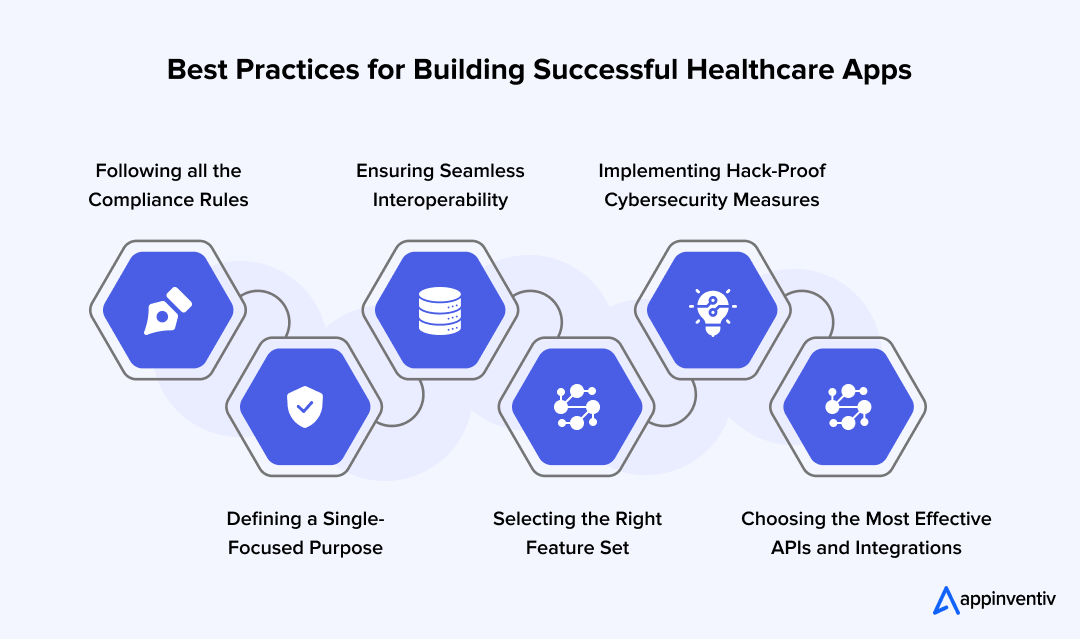
Following all the Compliance Rules
The healthcare industry is very strict regarding compliance with security and legal protocols. There are several legal compliances like HIPAA, HIMSS, FDC, etc., that you have to adhere to when developing an mHealth application. Let’s have a detailed look at those:
- HIPAA—All US healthcare entities must comply with HIPAA guidelines to ensure protected health information (PHI) security and privacy.
- CCPA – This is the law for the foundation of confidentiality in the US, which involves informing the client about what data is being collected and managing the client data report.
- GDPR – It is a personal data protection rule introduced in Europe in 2018. All healthcare apps that collect and store personal data in the European Union must comply with GDPR strictly.
- NIST – This is another collection of standard protocols, tools, and technologies created to protect user data from medical applications in the US.
- HiTech – These protocols focus more on the data security of EHR systems, which is particularly valid for healthcare and medical apps.
- PIPEDA – If your mHealth app is developed for the Canadian market, it must comply with PIPEDA.
Defining a Single-Focused Purpose
Even though there are several healthcare app categories, such as fitness tracking, post-operative care apps, and appointment booking apps, businesses should focus on one specific app category. When companies focus on a single expertise area and do not overwhelm stakeholders by offering multiple options within a single application, they can provide in-depth value and address their exact pain points with utmost detail.
Ensuring Seamless Interoperability
Passing information from one device to another is the essence of healthcare mobile apps. Therefore, developing a clear line of healthcare interoperability that is real-time and 100% secure is one of the most integral hospital app development best practices.
Selecting the Right Feature Set
The success of a health solution rides heavily on the healthcare mobile app features. While the selection of features varies significantly depending on the app’s type, some elements are commonly present in nearly all types of applications. These elements include but are not limited to:
- Monitoring health
- Scheduling appointments
- In-app payments
- Integration with wearables
- Reporting functionality
- Social integration (if a fitness app)
Implementing Hack-Proof Cybersecurity Measures
Health applications have to be absolutely hack-proof, which means they should strictly follow all cybersecurity measures to prevent data breaches and cyber theft. During the development of healthcare mobile applications, it is vital to follow legal compliances such as HIPAA or HIMSS.
This ensures complete adherence to the security level, ensuring that your app is 100% safe from cybercriminals’ malicious attempts. Furthermore, you can also add a biometric screen lock to enhance your app’s security and prevent data breaches.
Choosing the Most Effective APIs and Integrations
With so many APIs functioning in the market, it can be difficult to shortlist and go with the one that would make your processes real-time and hack-proof. But once you make the right API and integration choice, your healthcare app can offer the intended service to its complete perfection.
These are some of the top best practices for healthcare mobile app development that would ensure the growth and success of your application.
Healthcare App Development Features
While there are countless features you can add to your hospital or medical app, adding unnecessary features not only adds to the mobile healthcare mobile app development duration and cost but also makes it more intricate for common users. The successful healthcare apps have some essential features in common, which enhance customer experience and redefine the healthcare sector. Here’s a clear comparison table that outlines the key feature differences between a doctor’s app and a user’s (patient’s) app, tailored for a healthcare application development context.
| Feature | Doctor’s App | User’s App (Patient) |
|---|---|---|
| User Profile Management | Create doctor profiles with specialization, experience, and availability | Patient profiles with medical history, allergies, prescriptions, and vitals |
| Appointment Management | View, manage, and schedule appointments with patients | Book, reschedule, or cancel appointments with preferred doctors |
| EHR Access | Access patient Electronic Health Records (EHRs) | View personal health records and test results |
| Telemedicine / Video Calling | Conduct video consultations with patients | Join virtual appointments with doctors |
| Prescription Management | Generate and send digital prescriptions | Receive and store prescriptions securely |
| Symptom Checker Integration | Use patient data to support diagnostics | Input symptoms and receive preliminary analysis or doctor recommendations |
| In-app Chat / Messaging | Secure communication with patients | Chat with doctors for follow-up or clarifications |
| Notifications & Reminders | Get push notification alerts about upcoming appointments and patient updates | Receive reminders for appointments, medications, and follow-ups |
| Billing & Invoicing | Track consultation fees, generate invoices | Make payments, access billing history, download receipts |
| Analytics & Reporting | Monitor patient progress, consultation metrics | Track personal health improvements and fitness goals |
| Integration with Wearables | Receive patient health data in real-time | Sync fitness trackers or medical wearables with the app |
Next-Gen Advanced Features Every Healthcare App Must Have
Incorporating advanced features in a healthcare app enhances patient care, streamlines medical processes, and improves accessibility. Let’s look at some of the top advanced features for healthcare applications.
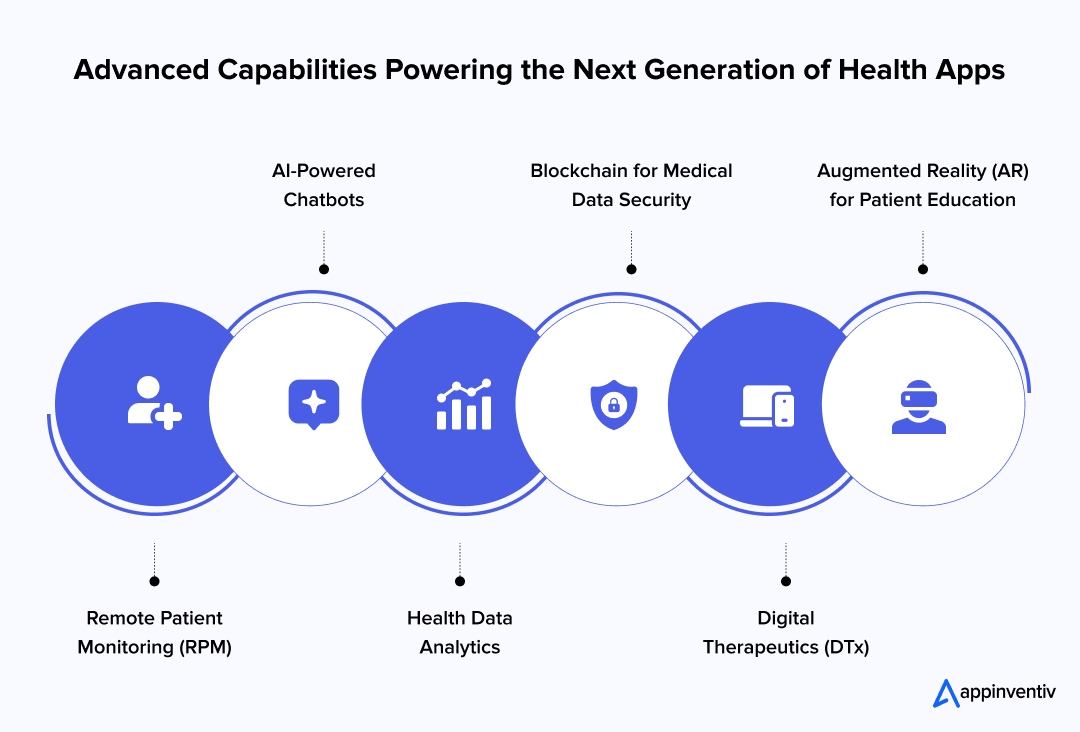
Remote Patient Monitoring (RPM): With the help of IoT-enabled devices and wearables, doctors can track patients’ vitals such as heart rate, blood pressure, and glucose levels in real time. This feature enables early detection of health issues and reduces the need for frequent hospital visits, improving patient care.
AI-Powered Chatbots: AI-driven healthcare chatbots provide instant responses to users’ medical queries, guide them through appointment bookings, and offer symptom-based recommendations.
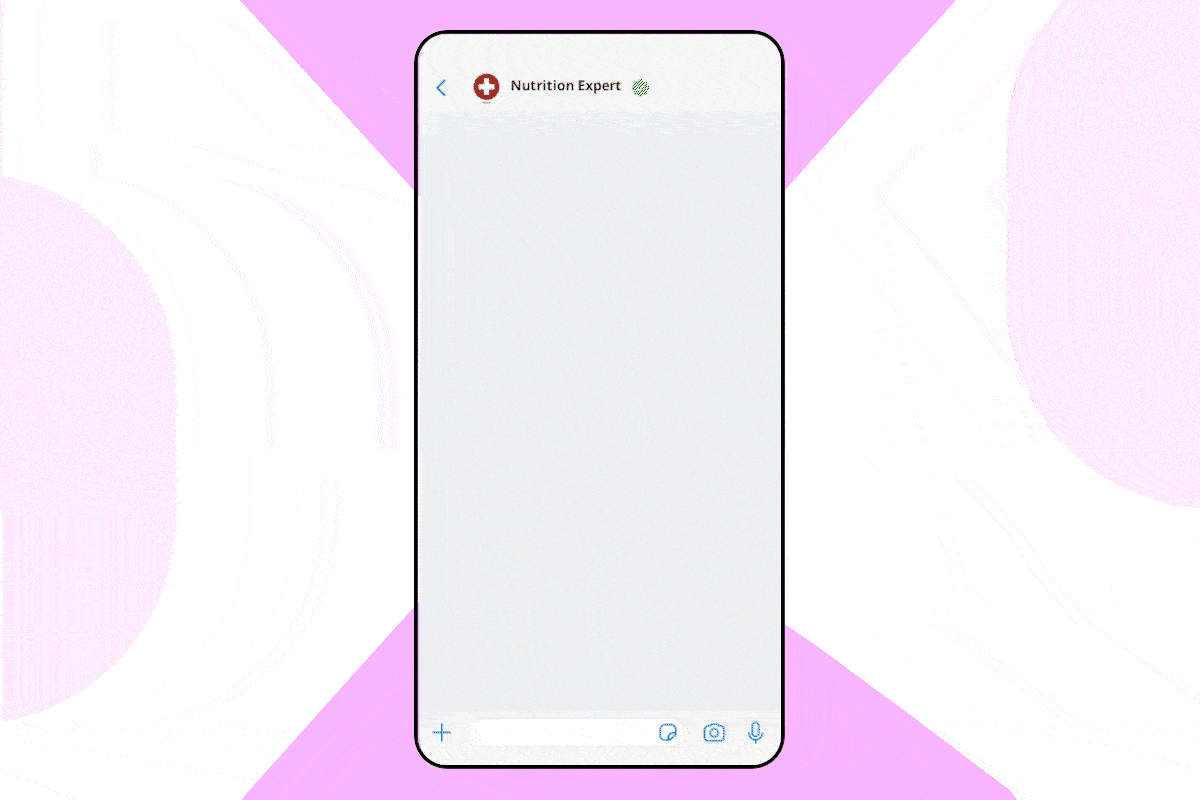
Available 24/7, these chatbots enhance user experience and reduce the need for direct human assistance in basic healthcare inquiries.
Health Data Analytics: By analyzing patient data, AI-powered health analytics provide valuable insights into wellness trends, medication adherence, and treatment effectiveness. These insights help both doctors and patients make informed decisions for better health outcomes.
Also Read: 10 Uses Cases of Predictive Analytics in Healthcare
Blockchain for Medical Data Security: Protecting patient information is more important than ever, and this can be seamlessly achieved through the implementation of blockchain technology in healthcare. Healthcare apps are now utilizing blockchain to safeguard and secure medical records. This added layer of security builds trust and helps healthcare providers follow strict privacy rules with more confidence.
Digital Therapeutics (DTx): Healthcare apps are no longer just for tracking symptoms, they’re also starting to play a role in treatment. Digital therapeutics are specially designed programs that help manage conditions like anxiety, depression, or chronic pain. They can work alongside traditional treatments or even help reduce the need for medication in some cases.
Augmented Reality (AR) for Patient Education: Learning about your health doesn’t have to be confusing. Some apps now use AR to show you things like how a surgery will work or what’s happening inside your body. It’s a more visual and hands-on way to understand your condition and feel more prepared for the care ahead.
Key Trends and Emerging Technologies Used for Healthcare Application Development
Healthcare businesses are now increasingly leveraging emerging technologies for healthcare application development. Integrating these technologies helps enhance processes, improve patient care, automate administrative tasks, and drive efficiency. Here is the list of key trends in mobile health app development and essential technologies that enhance the overall healthcare experience.
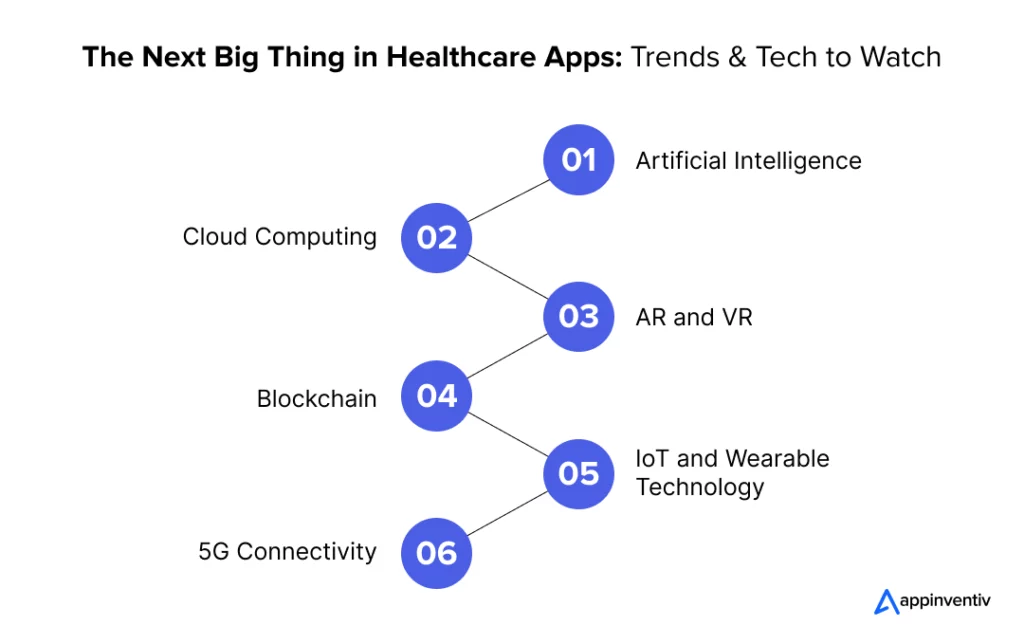
Artificial Intelligence
Artificial intelligence in healthcare tops the list with its remarkable use cases and capabilities to analyze patient data and automate rule-based processes. It also helps discover drugs, diagnose diseases, design personalized treatment plans, and predict health outcomes. By integrating AI-powered chatbots and virtual assistants in healthcare app development, medical professionals can immediately respond to patient queries, schedule appointments, and perform a variety of other tasks.
Here are some powerful AI-driven features transforming healthcare apps today:
- Medical Imaging Analysis: AI can analyze X-rays, MRIs, and CT scans to detect abnormalities such as tumors, fractures, or organ damage faster and more accurately than traditional methods.
- Predictive Analytics: Machine learning models in healthcare can anticipate potential health risks like stroke or heart failure by evaluating EHRs, lifestyle data, and wearable metrics, enabling preventive care.
- Personalized Treatment Planning: AI tailors treatment recommendations based on a patient’s genetic profile, medical history, and response patterns, improving therapeutic outcomes.
- Natural Language Processing (NLP): NLP in healthcare helps interpreting unstructured clinical notes, doctor-patient conversations, and research documents to extract insights and support clinical decision-making.
- Virtual Nursing Assistants: These assistants can provide medication guidance, check symptoms, and offer post-treatment care instructions, available 24/7 within the app.
- Automated Medical Coding & Billing: AI tools reduce administrative burden by extracting codes from physician notes and ensuring compliance in claims processing.
By leveraging these intelligent features, AI not only enhances diagnostic and operational precision but also personalizes care delivery, making it faster, smarter, and more accessible than ever before.
Also Read: AI in Dentistry – Key Benefits, Real World Applications and Examples
Cloud Computing
Cloud computing in healthcare applications brings several benefits, including health data analytics and data security, while allowing users to access information anywhere, anytime. Cloud computing features in healthcare apps facilitate record-sharing, streamlining backend operations and reducing expenses.
AR and VR
The impact of AR/VR in healthcare is rapidly expanding across various domains, revolutionizing patient care and medical training. One example is the FitXR BoxVR sports application, which leverages VR for immersive fitness experiences. These technologies are also transforming surgical education by enabling professionals to practice intricate procedures in a risk-free virtual environment.
Blockchain
Blockchain in healthcare is a significant mobile app development trend. It helps manage EMR and EHR data, conducting research, and improving the insurance and hospital billing process. This is why a growing number of hospitals are developing apps using blockchain technology to manage patients’ records and facilitate secure transactions.
IoT and Wearable Technology
Healthcare IoT app development, along with connected devices and wearables, enables real-time monitoring of vital signs, medication adherence, and overall health status. These technologies provide patients and healthcare providers with continuous health insights, allowing for timely interventions and improved decision-making. By facilitating remote patient monitoring, they enhance chronic disease management, promote proactive care, and help reduce emergency visits.
The seamless data exchange between wearables and healthcare systems improves personalized care. Ultimately, IoT in healthcare enhances preventive care and promotes better health outcomes.
5G Connectivity
5G technology revolutionizes healthcare by providing ultra-fast, low-latency connectivity for seamless communication and data transfer. It enhances telemedicine by enabling high-resolution video consultations and real-time remote diagnosis.
The integration of 5G with IoT improves remote surgeries, wearable device performance, and emergency response systems. Healthcare providers can process large medical datasets quickly, improving efficiency and decision-making. With better connectivity, 5G expands healthcare access, especially in remote and underserved areas.
Also Read: Innovative Technology Changing Healthcare Sector
Custom Healthcare App Development Cost and Time
Healthcare application development duration and cost vary depending on various factors such as healthcare mobile app features and functionalities, UI/UX design, app security level, app’s platform, location of the app development company, and so on. These are a few of the considerable factors you must evaluate before setting a budget for hospital mobile app development.
While various factors contribute to custom healthcare app development costs and duration, features, and functionalities are the most significant elements contributing to overall development costs. Therefore, to help you make an informed decision, here is a time and cost breakdown for mobile health app development.
| Development Stage | Estimated Time (in hours) | Estimated Cost (in USD) |
|---|---|---|
| Project Discovery & Planning | 80–120 | $5,000–$12,000 |
| UI/UX Design | 120–180 | $8,000–$20,000 |
| Frontend & Backend Development | 1,200–1,600 | $70,000–$130,000 |
| API Integrations | 200–300 | $15,000–$30,000 |
| Quality Assurance & Testing | 150–250 | $10,000–$25,000 |
| Compliance & Security Setup | 100–200 | $12,000–$35,000 |
| Deployment & Support | 80–150 | $5,000–$15,000 |
| Total | 2,000–2,800+ | $50,000–$300,000+ |
On average, the total cost and time to build a healthcare app can range between $50,000-$300,000 and 3-18 months, respectively, depending on the app’s functionalities and other vital factors listed above.
How to Generate Revenue from Your Healthcare App
Choosing the right monetization strategy is crucial for long-term success if you’re building a healthcare app. You need a model that generates revenue and provides real value to users while staying compliant with industry regulations. Here are some of the most effective ways to make money from a healthcare app:
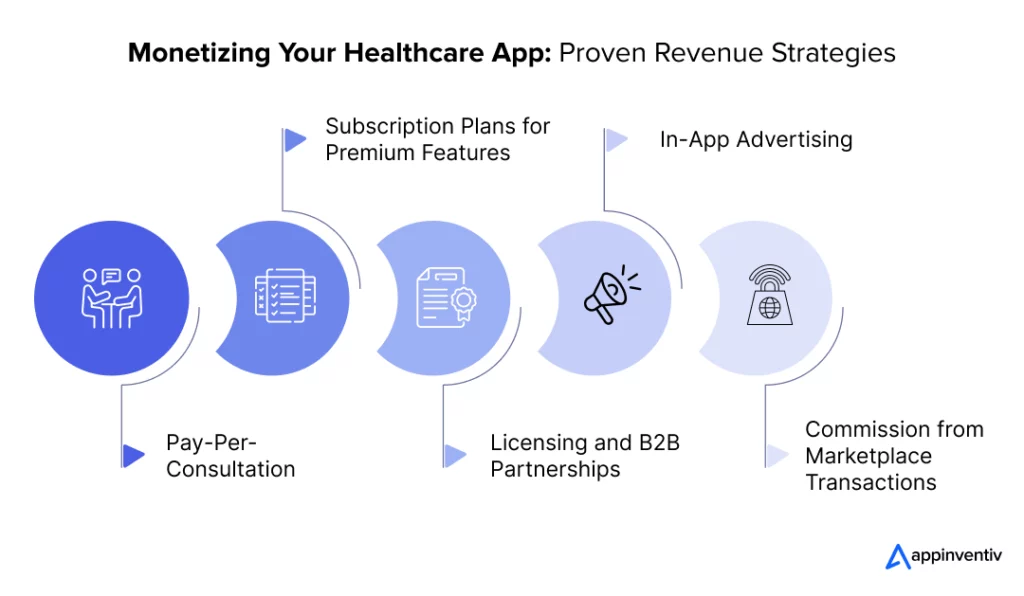
Pay-Per-Consultation
This model works well for telemedicine apps, where users pay per session to consult with doctors, therapists, or fitness experts. It’s ideal for those who prefer one-time services rather than a recurring subscription.
Integrating secured payment gateway options, easy scheduling, and high-quality video consultation features, make this model effective. Users appreciate the flexibility of paying only when needed, whether it’s a quick virtual doctor visit or a mental health counseling session.
Subscription Plans for Premium Features
A subscription model lets users pay a recurring fee, monthly or yearly—to unlock premium features like expert consultations, personalized health insights, or advanced analytics. This approach ensures steady income and keeps users engaged for the long run.
Many successful apps offer multiple pricing tiers so users can choose a plan that fits their needs. For instance, Calm provides guided meditation and mental health support under a paid subscription model.
Also Read: Cost to Develop a Meditation App Like Calm
Licensing and B2B Partnerships
Many healthcare apps also generate revenue by licensing their technology or partnering with healthcare providers, insurance companies, or corporate wellness programs. In this model, the app is integrated into enterprise solutions, allowing businesses to provide healthcare services to employees, patients, or customers.
This approach works well for mental health apps, chronic disease management platforms, and fitness applications. Insurance companies may also offer discounts to users who regularly engage with the app, driving both adoption and profitability.
In-App Advertising
Ads can be a great source of revenue if done right. Healthcare apps can partner with relevant brands, such as pharmaceutical companies or wellness brands, to display ads that align with user interests.
The key is to keep them non-intrusive so they don’t disrupt the user experience. Personalized ad placements, like recommending a vitamin brand to someone tracking their nutrition, make this model effective while keeping users engaged.
Commission from Marketplace Transactions
If your app connects users with healthcare providers, diagnostic centers, or pharmacies, you can earn money by taking a commission from each transaction. This works well for apps that offer appointment scheduling, prescription refills, or lab test bookings. By acting as a middleman, your platform can simplify the process for users while generating steady revenue.
How Appinventiv Helped a Healthcare Provider Boost Operational Efficiency by 30% with an AI-Driven App
Our team at Appinventiv partnered with a leading multi-specialty healthcare provider struggling with inefficiencies in patient intake, appointment scheduling, and day-to-day triage operations. With seven centers handling over 500,000 patients annually, the organization faced mounting administrative burdens and fragmented workflows that impacted both staff productivity and patient satisfaction.
To solve this, we developed a custom AI-powered healthcare app that seamlessly integrated with their existing EHR system. The solution featured smart triage, AI-driven virtual assistance for appointment management, real-time health record syncing, and automated billing support. Designed with scalability, compliance, and user experience in mind, the app transformed how the provider delivered and managed care across departments.
The Results?
- 30% improvement in operational efficiency across scheduling, triage, and communication
- 22% reduction in appointment no-shows, thanks to AI-driven reminders and smart scheduling
- 40% faster triage for common symptoms through the integrated virtual assistant
- HIPAA-compliant infrastructure, ensuring full data privacy and security
- Enhanced patient satisfaction, with over 80% reporting improved access and experience
How Can Appinventiv Help You with Healthcare App Development?
The future of healthcare is digital, connected, and patient-centric. As the industry accelerates toward remote care, personalized treatment, and data-driven decision-making, healthcare mobile apps are at the core of this transformation. From AI-powered diagnostics to real-time patient monitoring and secure data interoperability, mobile solutions are set to revolutionize how care is delivered, accessed, and experienced.
And in this dynamic healthcare landscape, we can’t evade the importance of healthcare mobile application development. It has become a revolutionary way to streamline operations, manage data, enhance patient care, gain competitive advantages, and redefine the industry. At Appinventiv, we specialize in building future-ready healthcare solutions tailored to the industry’s complex and sensitive demands.
As a reputed healthcare app development services company, we ensure that every healthcare app we build, from clinical management to efficient patient treatment and diagnosis, we provide you with the best-in-class healthcare app solution that keeps you ahead of the crowd.
We have spent over a decade building digital solutions that actually make a difference in healthcare. Our team of over 1,600 technology professionals has worked with major healthcare innovators like Health-e-People, Soniphi, and DiabeticU, creating mobile applications that prioritize security, scalability, and genuine user experience. You can gain deeper insight into the impact of our work and the value we’ve created by reviewing our client testimonials and project success stories.
Our excellence in innovation has been recognized by several industry-leading awards, including “Tech Company of the Year” at the Times Business Awards 2023 and “App Development Company of the Year” by Entrepreneur.com. Deloitte included us in their Technology Fast 50 India list for 2023–2024, and the CIO Klub selected us as a Preferred Partner for our role in digital transformation initiatives. This year, Clutch awarded us their Global Spring Award 2024, which validates our position as a reliable technology partner for organizations worldwide.
Our healthcare app development span:
- Telehealth and remote consultation platforms
- Electronic Health Records (EHR) systems
- mPrescription and medication tracking solutions
- Health insurance and claims management apps
- Laboratory and diagnostic workflow management
- Lifestyle and wellness tracking tools
- Healthcare CRM and process automation
- Seamless integration with wearables and legacy software
We are also an ISO 27001-certified company, committed to the highest standards of data security and compliance, vital in the healthcare domain. With strategic partnerships with AWS, Microsoft Azure, and Google Cloud Platform, we ensure that every healthcare app we build is scalable, secure, and future-ready.
To get an insight into our expertise in developing cutting-edge mobile apps and medical IT solutions for various domains, including healthcare mobile app development, dig deep into our portfolio and make a confident decision.
Talk to us to digitize your healthcare business now.
FAQs
Q. How much does it cost to develop a healthcare app?
A. The cost to build a healthcare app would range somewhere between $50,000 to $300,000 or more. The healthcare mobile app development cost can vary depending on the platforms, technology stack, number of features to be integrated into your app, and other considerable factors. If you want to know the complete steps on how to develop a medical app and the cost to build one, connect with our experts today.
Q. How long does it take to develop a healthcare app?
A. The average time to develop a healthcare app typically ranges from 3 to 18 months. However, this timeline can vary based on several factors, including the app’s complexity, feature set, design requirements, regulatory compliance, and integration with third-party systems like EHRs or wearable devices.
Custom functionalities, testing cycles, and approval processes can also extend the development period. Working with an experienced healthcare app development partner can help streamline timelines without compromising quality or compliance.
Q. Which technology is best for healthcare mobile app development?
A. When you build a healthcare app, the most common technologies used are Python, JAVA, Flutter, Swift, Kotlin, R Programming, etc. However, it’s recommended to seek your development team’s advice while choosing a technology stack. Your healthcare app developers will choose the best technology stack based on your app requirements.
Q. Why do healthcare apps fail?
A. Most healthcare apps fail due to misleading information on health diagnosis, lack of techniques in clinical settings, inability to adapt to user behavior, inefficient app security, etc. However, you can overcome such challenges in the initial stages with the help of your development team.
Q. What makes a healthcare app successful?
A. According to healthcare experts, detailed and actionable information on the healthcare app can make it successful. Typically, patients download healthcare apps to track and monitor their wellbeing. Therefore, providing the right information and solutions to the users can make your app a big hit in the market.
Q. Why do healthcare apps need to be HIPAA compliant?
A. If your healthcare app collects, manages, and transfers any protected healthcare information, it is advisable to develop it with HIPAA compliance. This ensures that the medical information is encrypted and will only be accessed for the patient’s diagnosis and research.
Q. How to develop a healthcare app?
A. Building a healthcare application requires careful planning and understanding of the unique challenges in medical technology.
- Start with real problems
- Define your user base clearly
- Plan for regulatory compliance early
- Design for clinical workflows
- Test in real clinical settings
- Plan for ongoing maintenance
Q. How to choose the right healthcare mobile app development partner?
A. Selecting a development partner for healthcare applications requires more scrutiny than typical software projects. Here are some of the top ways to choose the right partner for your project:
Look for Healthcare-Specific Portfolio: Seek partners who have built medical applications before and understand concepts like clinical workflows, medical terminology, and healthcare compliance requirements. Analyze their portfolio well to get a detailed understanding.
Verify Regulatory Knowledge: Your medical mobile app development partner should be able to explain how they’ve handled HIPAA compliance, FDA requirements for medical devices, or other regulatory challenges in previous projects.
Assess Technical Capabilities: Your partner needs experience with healthcare APIs, HL7 standards, and interoperability challenges that are unique to medical environments.
Evaluate Security Expertise: Look for partners who understand healthcare-specific security requirements and can implement robust encryption, access controls, and audit trails that meet medical standards.
Consider Long-term Partnership Potential: Choose a partner who views your project as a long-term relationship rather than a one-time build.
Review Their Quality Assurance Processes: Your development partner should have rigorous testing procedures, including security testing, compliance validation, and user acceptance testing with actual healthcare professionals.
Q. How to ensure data security in healthcare mobile app development?
A. Healthcare data security goes far beyond standard app security practices. Here are some of the top ways through which you can ensure complete data security of your app during the development phase.
- Implement defense in depth
- Understand data classification
- Plan for access controls
- Design for audit requirements
- Secure data both at rest and in transit
- Handle authentication carefully
- Plan for incident response
- Regular security testing
- Consider device security
- Train users on security practices


- In just 2 mins you will get a response
- Your idea is 100% protected by our Non Disclosure Agreement.
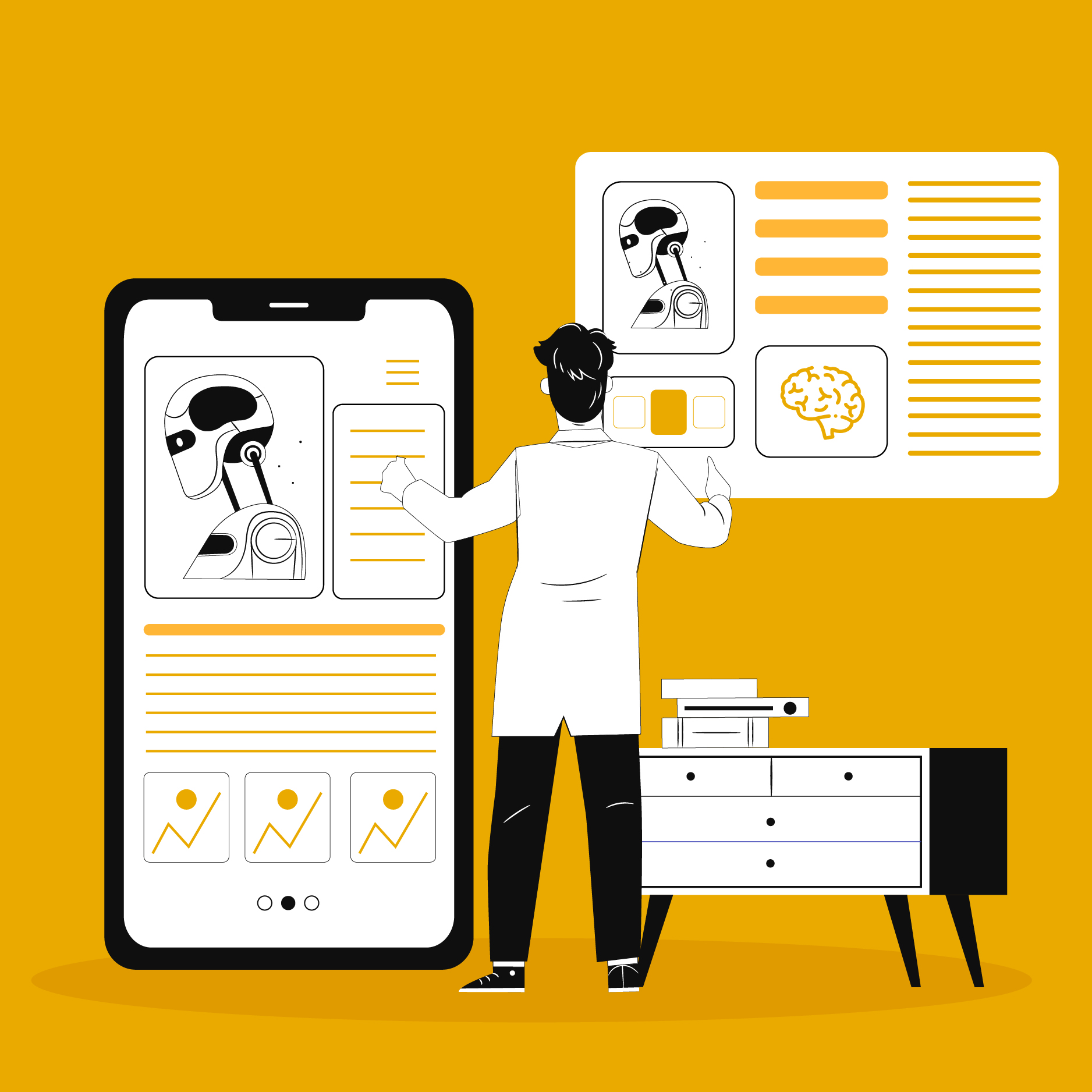
When Satya Nadella took the reins at Microsoft, he famously declared that every business needed to become a software company. Nadella's statement wasn’t just tech jargon—it was a wake-up call that reflects the broader trend of digital transformation. Across industries, from retail and finance to manufacturing and logistics, companies are realizing that embracing digital transformation…
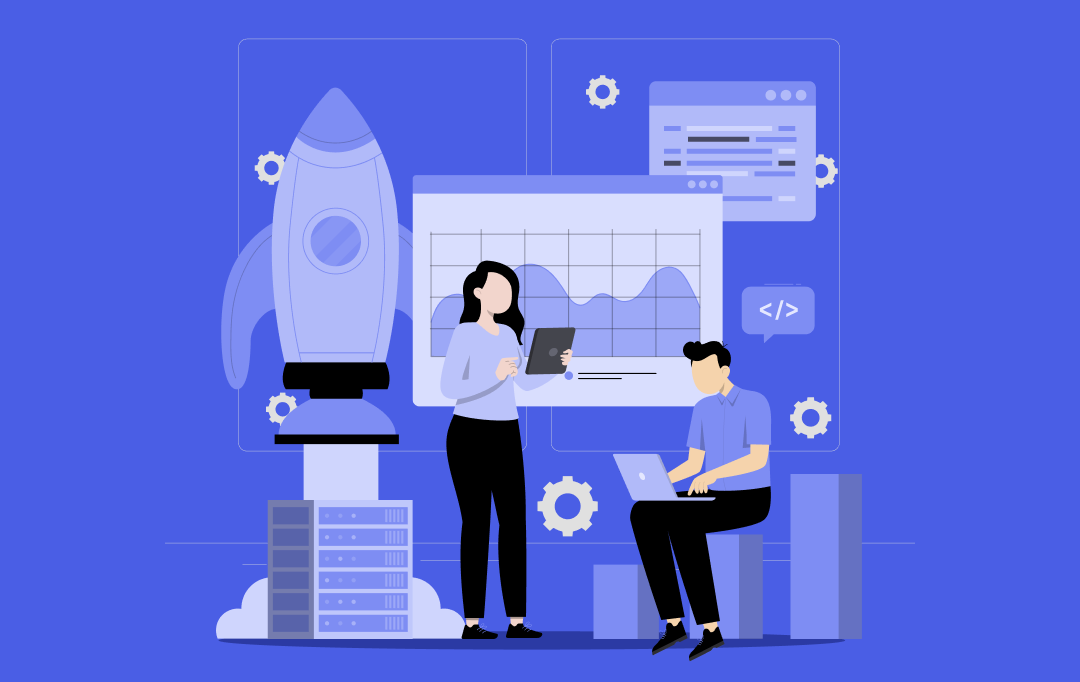
Outsourcing product development is not just a buzzword or a futuristic concept; it is a present reality in the modern business world. What started as a trend during the COVID-19 pandemic has become a new norm for businesses across industries. The Grand View Research report indicates that the global business process outsourcing market will hit…

Software product development has become a central part of how companies grow today. Teams are no longer building digital tools just to keep up. They are building them to create real advantages in efficiency, revenue, and customer experience. Deloitte’s Technology Value survey notes that nearly three out of four organizations increased their investments in AI…





















